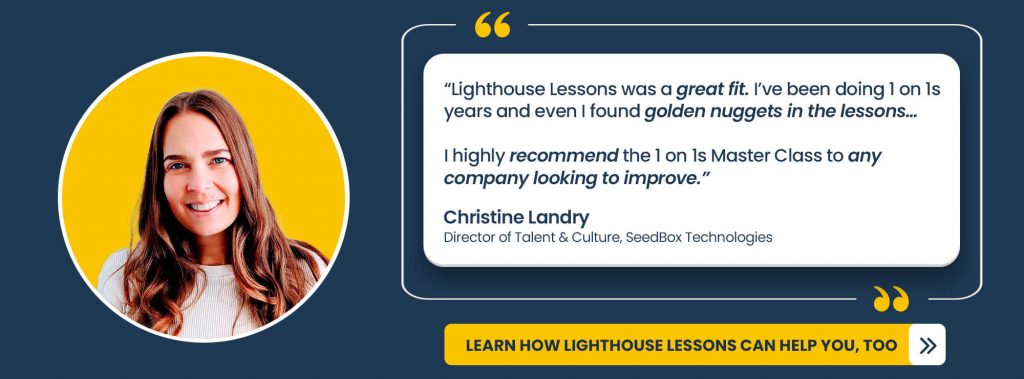Are you having one on ones? Many of the top leaders in business swear by the value of regular one on one meetings.
Ben Horowitz considers one on ones so important he was willing to fire a senior leader who wasn't having regular one on ones with their direct reports.
Former Intel CEO Andy Grove dedicates an entire section to one on ones in his legendary leadership book, High Output Management.
SaaStr Founder, serial entrepreneur, and investor Jason Lemkin called one on ones the "#1 management hack” and says, "There isn't a better investment you can make in your VPs than meeting either once a week, or at least, once every 2 weeks.”
Meanwhile, Marc Benioff, founder of Salesforce, the team at Bufferapp, and many, many others also praise the value of one on one meetings.

Yet, many are uncertain how to get these benefits
Some people see one on ones as a waste of time; they can't imagine dedicating so much time on their calendar to these meetings.
Others are unsure of how to make the most of them.
Ask 10 managers and you very well could get 10 different answers on how much they value them, and what they use the meetings for.
That's why we're going to demystify one on ones a bit today. We've talked at length about the value of regular one on ones and how to make them effective both from a manager's perspective and an employee's.
However, if you're new to one on ones (whether you're a manager or an employee), you might simply be wondering what to expect when you start having regular one on ones.
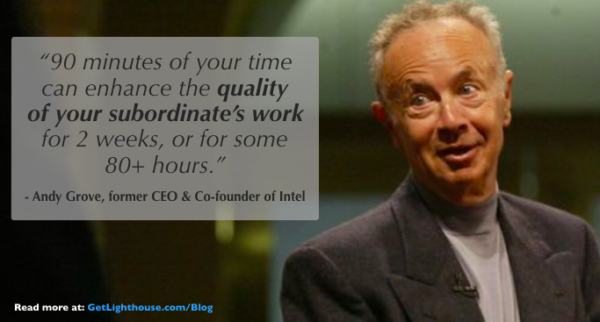
Want to make the most of your one on one meetings?
If you're a manager who is new to having one on one meetings, you're probably wondering how to make the most of them. It's a big investment of you and your team members' time after all.
A lot goes into having successful one on ones, including:
- Having a one on one agenda to guide each meeting
- Choosing the right frequency and logistics
- Bringing great one on one questions, and
- Making it actionable and accountable
However, that's just the beginning. If you want to learn the essential tips for making your one on ones highly effective, start with our mega guide that includes a free one on one meeting template you can download.
Then, grab our downloadable and printable one-sheet guide on the do's and don'ts for awesome one on ones below:
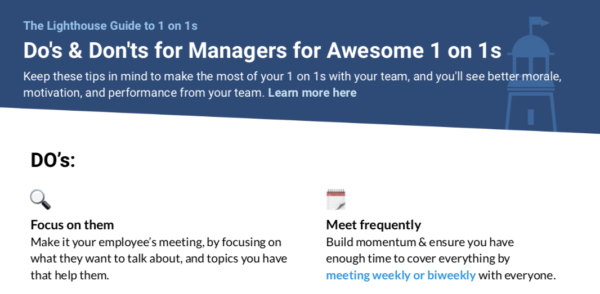
What to Expect In Your First One on One Meeting with an Employee
If you're convinced of the value of these meetings and are getting started with one on ones now, then you're in for a few surprises. Fortunately, we're here to help.
In this post, we'll covering...
Table of Contents
- What to expect in your first one on one meetings with an employee
- They are different than any other meeting
- You will learn important things you won't hear any other way
- You both should bring things to talk about
- They may be a little awkward at first
- They'll evolve over time as your career changes and your team grows too
- You can really practice and develop your listening skills in them
- You will quickly learn why this is a manager's best tool
- Additional resources for getting started with one on ones
- Frequently asked questions
Here are a few tips for what you should expect:
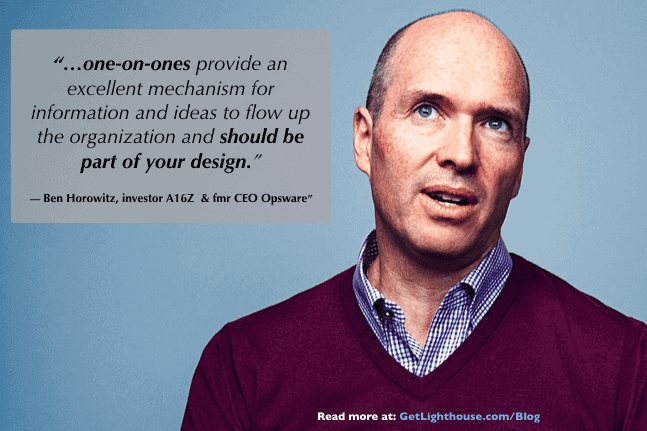
1) They are different than any other meeting
As a manager and leader, you're in a lot of meetings. Your calendar likely includes more of them than you should be, or would like to attend. And in most of them you're being asked to give your opinion, make decisions, and answer questions that all focus on driving the business forward.
One on ones are nothing like that.
As Ben Horowitz suggests after he took some heat for his firm stance on the importance of having one on ones,
"The key to a good one-on-one meeting is the understanding that it is the employee's meeting rather than the manager's meeting.
This is the free-form meeting for all the pressing issues, brilliant ideas and chronic frustrations that do not fit neatly into status reports, email, and other less personal and intimate mechanisms.”
It bears repeating: One on ones are all about your team member, not you nor the company. You need to flip your mindset to thinking about what's important to them and how you can help.
This context switch can be difficult, but the payoff is huge. Set the standard that you recognize that these meetings are different from other meetings and you'll be on your way.

2) You will learn important things you won't hear any other way
You may think you know your team really well. You may think you know everything they're thinking about for work, and that you have addressed all their concerns they've aired publicly.
If you've put in some effort to listen to your team in a group setting, that's a great start, but there is always more they'll bring up privately, if you give them the chance.
As URX CEO John Milinovich said in his interview with First Round Capital:
"There will always be things that people won't bring up in a community forum that are still so important to address, especially before they become bigger issues.”
Build a trusting environment in your one on ones and follow through on what you hear and you'll be amazed at what you'll learn people are thinking about or have concerns with.
The more you act on what they tell you, the more they'll share. These insights will improve the company, your team, your management, and them as an employee. For the introverts on your team, who are less likely to bring up any issues publicly, this will be especially important.
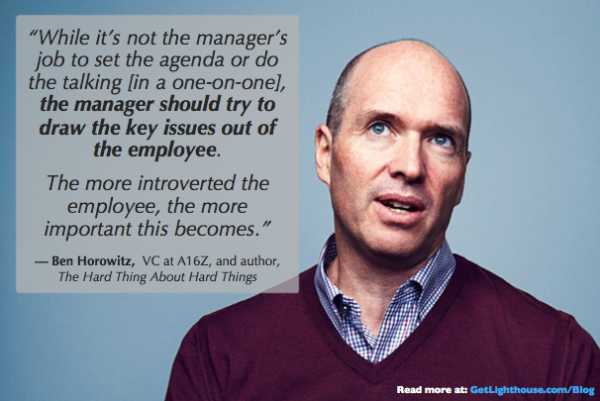
3) They should bring things to talk about, and so should you.
It's easy to put the obligation on your team member to drive the one on one. It's definitely important to let them talk about things that are important to them.
However, especially early on, you need to bring some questions as well. There are a ton of different one on one questions you can rotate through and you can also use one on ones as great coaching opportunities.
As Melanie Whelan, then CEO of SoulCycle, remarked in her NY Times interview, asking questions is a big part of your job as a leader:
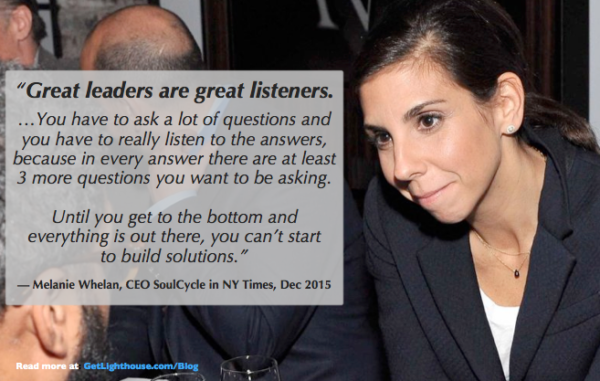
By mixing up the questions you ask, you will ensure you're not missing anything they may be afraid to bring up. You'll also avoid one on ones getting into a rut where certain topics become safe and easy, at the expense of never discussing any elephants in the room.
You get out what you put into your one on ones, so prepare, listen carefully, and follow through.
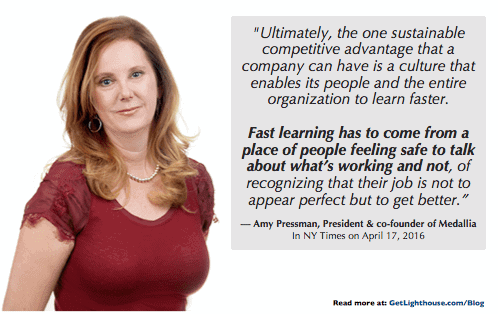
4) They may be a little awkward at first
Your first one on one meetings with an employee won't be easy. It can be especially awkward if you recently got promoted and now you're having a one on one with a former peer.
Fight through your ‘fight or flight' urge, and instead try a variety of great one on one questions to see where you can break through. Those early questions will break the ice and give you your first opportunities to build deeper trust and rapport with them.
Over time, if you stick with it, you'll find they get easier and easier. Then, you'll get in a rhythm and it will be easy to talk about all kinds of topics with each of your team members..
It's worth pushing past the akward, because the benefits are huge as angel investor and serial entrepreneur Michael Wolfe wrote:
"Over time you can build up a very good relationship with most people simply through this time investment.
Even though you may need to discuss tough issues, try to build up enough trust and openness between you that you can enjoy solving problems and working to make the company better.”
It's a relief when a problem at work is solved. If you form a real partnership with your team member to address the issues they bring up, they'll trust and respect you more. This can hold true even if you don't always give them the answer they want to hear.

5) They'll evolve over time as your career changes and your team grows too
As your employees grow and develop, your one on ones will too.
What you talk about and work on in your one on ones is based on where that employee is when you're talking to them– professionally and personally. And that is a moving target.
App Sumo CEO Ayman Al-Abdullah captures this idea well in this tweet:
Every great management book says that the employee should set the agenda for the 1:1. I never understood that concept. If you're the coach, you should dictate what happens at practice.
— Ayman Al-Abdullah 🧱 (@aymanalabdul) November 18, 2017
If you're just starting out, you need to focus on building rapport and trust. Without it, they won't be comfortable talking about any of the other topics you can cover.
Then, as they do become comfortable, you'll be asking critical questions to find out where they're blocked, frustrated, unhappy, or simply see things that need fixed. If you've done a really good job, they might even start bringing up some topics on their own.
Later, as you continue to have one on ones with that employee, they'll change again as you begin to work more on their professional development, becoming as much a coach as a manager to them. This is critical, as growth is one the top perks employees want.
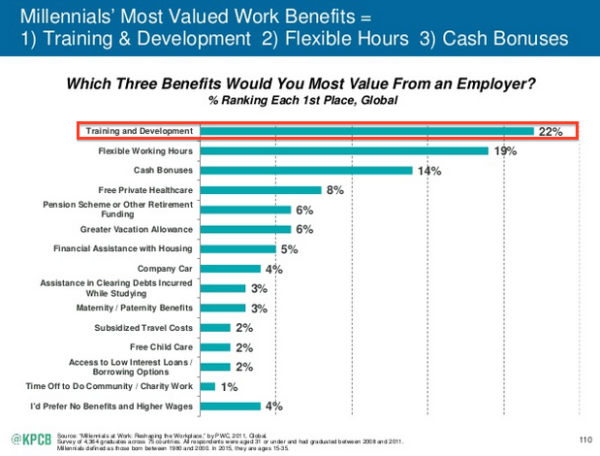
And yet again that could change if they take up a new task that they're not as skilled at. As your team's needs change, and people get promoted, they'll need your support to successfully transition. This is especially important if you start developing them into a leader.
Ultimately, you decide where your one on ones with them go. You can help guide the meeting by the topics you add to the agenda, and the questions you ask.
By being intentional about what you talk about, and evolving it alongside your relationship and their career, you'll always make the most of these meetings.

6) They're the best place to develop your listening skills
Listening is one of the most important skills a manager can develop. That's because it can help you uncover important insights that help you lead better in virtually every way.
One on ones are a great place to develop your listening skills. They give you a dedicated block of time where you can have a focused, ongoing discussion with each of your employees.
However, keep in mind that effective listening means more than keeping your ears open when they're talking. You need to make sure you're processing the information correctly by checking in with them as you go.
Use the highest level of active listening skills, reflecting, to make sure you're fully comprehending the meaning behind what they're saying:
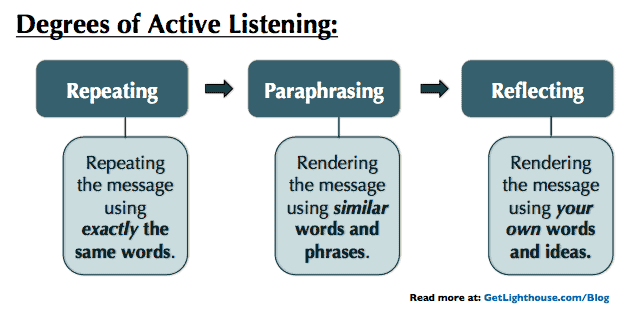
After your employee comments or responds to something, share in your own words what you believe they meant. Then, see if they agree with what you said.
By asking good followup questions, and clarifying what you think you heard from them, you'll ensure that all your conversations have strong outcomes. You can avoid many misunderstandings by taking a few moments to tell them what you think you heard.
Questions are tools of great listeners
Asking the right questions are an important part of developing your listening skills in one on ones. Good question can help steer your conversation towards valuable connection, insights, and ideas from your team members.
Try asking questions like these:
- What's a recent situation you wish you handled differently? What would you change?
- How many hours a day do you feel you're productive? How could we help you be more productive?
- What do you like about my management style? What do you dislike?
- What have your past managers done that you'd like me to also do or not do?
- Are there any aspects of our culture you wish you could change?
- How could we be more creative or innovative as a company?
For more great one on one questions, read: 102 One on One Meeting Questions Great Managers Use to Create High Performing Teams.
It can be hard to think on your feet in a group meeting, with all kinds of chatter and notifications happening.
Fortunately, the quiet, focused one on one meeting provides you and your team member a calmer opportunity to listen and learn from one another. Set a good example by being a good listener.

7) You will quickly learn why this is a manager's best tool.
The conversations you have in your one on ones are the key to understanding your people and motivating them. Everyone has different drivers and idiosyncrasies; the better you understand them, the more effective you'll be able to work with them.
As Ben Horowitz notoriously recalls when he almost fired two people over a manager not having one on ones:
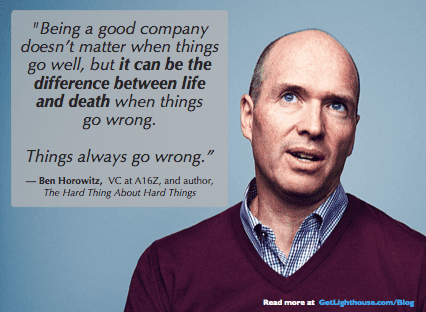
Unfortunately, if you don't do one on ones, Ben continued:
"…there is no possible way for him to even be informed as to whether or not his organization is good or bad.”
You can fix so many problems and improve the morale of everyone on your team with these meetings. You'll find out about issues before they blow up. You'll be able to help people when they're struggling and give them good and bad feedback regularly. You can talk about career goals and growth opportunities regularly.
Bit by bit you'll see improvements across your company and you'll wonder why you didn't start them sooner.
Get started with regular one on ones with your team today
The best way to learn what one on ones are like is to start having your first one on one meetings as soon as you can.
They might start slow, but invest the time and effort with each of your team members and you'll see a big return both in their own development and in the insights you're able to uncover along the way that help you become a better leader.
And don't forget to check out the further reading below to learn more about getting started with your first one on one meetings with your employees, how to make them great, and how they develop over time.
Further reading:
- Why Your One on One Needs a Meeting Agenda (and How to Make Them Great)
- Manager's Guide: How to start one on ones with your team
- One on One Meeting Questions Great Managers Ask Their Teams
- 1-on-1 Development: How to Make the Most of Your 1-on-1s throughout You and Your Team's Careers
- 10 Things Every Employee Should Know About Their One-on-Ones
- It's a great place to talk about their careers, too
Are you and your managers wasting their 1 on 1s?
There is no greater investment to make in your team than having 1 on 1s. Yet, done poorly they’re a huge waste of time.
That’s why we made the 1 on 1 Master Class. You and your fellow managers learn step by step how to supercharge these meetings to motivate your teams, fix problems, coach your people, and much more.
You can learn how Lighthouse Lessons can help your leaders like we helped SeedBox Technologies by signing up here.
